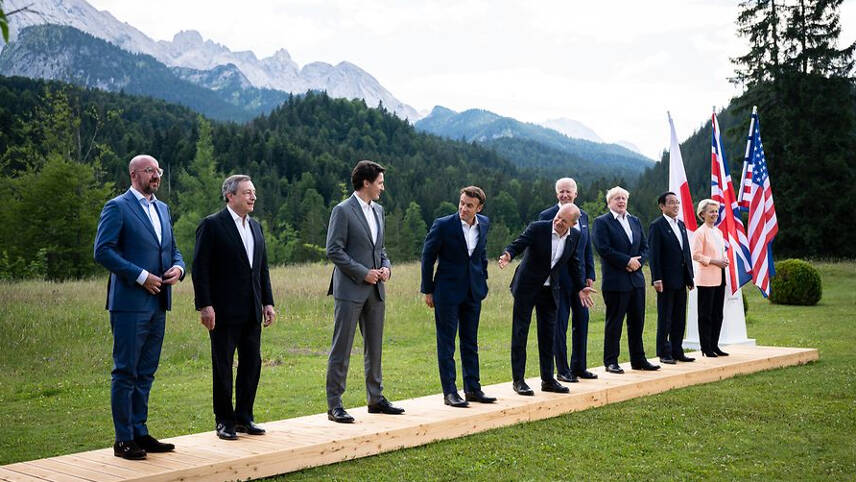Register for free and continue reading
Join our growing army of changemakers and get unlimited access to our premium content

Image: G7 Germany.
In an interview with BBC Radio 4 at the weekend, Johnson spoke directly from the G7 Summit in Berlin about discussions on energy decarbonisation and security. He indicated that, as more renewable electricity generation comes online in the UK, wholesale wind and solar prices should be taken into account to a greater extent in electricity pricing.
“People are being charged for their electricity prices on the basis of the top marginal gas price, and that is frankly ludicrous,” said Johnson. “We need to get rid of that system and we need to reform our energy markets as they have done in other European countries. That is one of the ways, by reforming the market, by changing the way things work, you can get prices down.
The UK Government had already, before the Energy Security Strategy was published in April, confirmed plans to begin altering the levies placed on gas and electricity. This move is intended to encourage individuals to transition to electric vehicles (EVs) and electric heating systems, by making electricity cheaper – especially renewable electricity.
But green groups have stated that Johnson is likely to be looking at far broader and deeper reforms at this point. Greenpeace UK’s chief scientist and policy director Doug Parr wrote on Twitter that Johnson’s comments indicate that “the UK electricity market is about to undergo the biggest shake-up since privatisation over 30 years ago”.
“For a Prime Minister like Johnson, who is famously not a ‘details’ man, to be quoting this change in a high-profile BBC interview shows he is aware of the issue and that conversations are live in 10 Downing Street about changing it,” Parr continued. “The details of what the market structure is going to look like will affect investment decisions. Yet the investment pipeline needs to be maintained alongside these much-needed market reforms, a tricky balancing act which I hope the current Government is up to”.
Any changes are likely to be confirmed in the forthcoming Energy Bill. This has been promised by the Government by the end of 2022. Some commentators claim that publication is likely before Parliament’s summer recess begins next month, with the energy price crisis having pressured civil servants into readying the documents more rapidly.
Information about the potential market structure may yet arise from the G7 talks, albeit in a less formal manner. National leaders and their Ministers will be in Berlin until Tuesday (28 June) afternoon, with a final communique due that evening. Last year’s talks in Cornwall resulted in new agreements on climate risk reporting and transitioning to net-zero energy systems in the 2030s.
Energy Charter Treaty
Johnson gave the interview to Radio 4 shortly after the UK Government announced success after two years of international negotiations to modernise the Energy Charter Treaty. The need to deliver the transition to net-zero by 2050, in line with the Paris Agreement, was cited by Ministers as the primary reason for updating the Treaty, which was initially published in 1994.
The Department for Business, Energy and Industrial Strategy (BEIS) stated that the initial Treaty was signed “in a world when fossil fuels dominated power generation” and did not offer adequate legal protections for those investing in renewables at present, when renewables account for 40% of the UK’s electricity generation mix.
Changes made to the Treaty include the addition of legal protections for international investors funding renewable electricity generation, low-carbon hydrogen production and carbon capture activities in the UK. At the same time, legal protection for overseas investment in new fossil fuel projects will be phased out. This latter change will come into effect immediately after the Treaty is signed.
For existing fossil fuel projects, coal investments will lose legal protections from October 2024, in line with the UK’s national coal phase-out. All other projects will lose protection within a ten-year period, except for gas power stations fitted with carbon capture.
This will come as welcome news to the green groups to have expressed disappointment in the Government’s recent support for expanding domestic fossil fuel production in the North Sea and potentially for restarting fracking. More information on a potential U-turn on the UK’s fracking ban is expected this week, as the British Geological Survey is due to provide updated scientific information to BEIS.
BEIS said in a statement that it wants to “limit costly legal challenges” from fossil fuel investors and place a “much stronger focus” on promoting the scaling of alternative energies in changing the Treaty.
“The UK cannot support an outdated treaty which holds back investment in clean energy and puts British taxpayers at increased risk from costly legal challenges,” said Energy Minister Greg Hands. “Our success in negotiating a modernised Treaty will boost our move to cheaper and cleaner energy by providing greater confidence to the private sector investors and risk-takers we need for this transition.”
An official signing of the updated Treaty is set to take place in November.


Please login or Register to leave a comment.